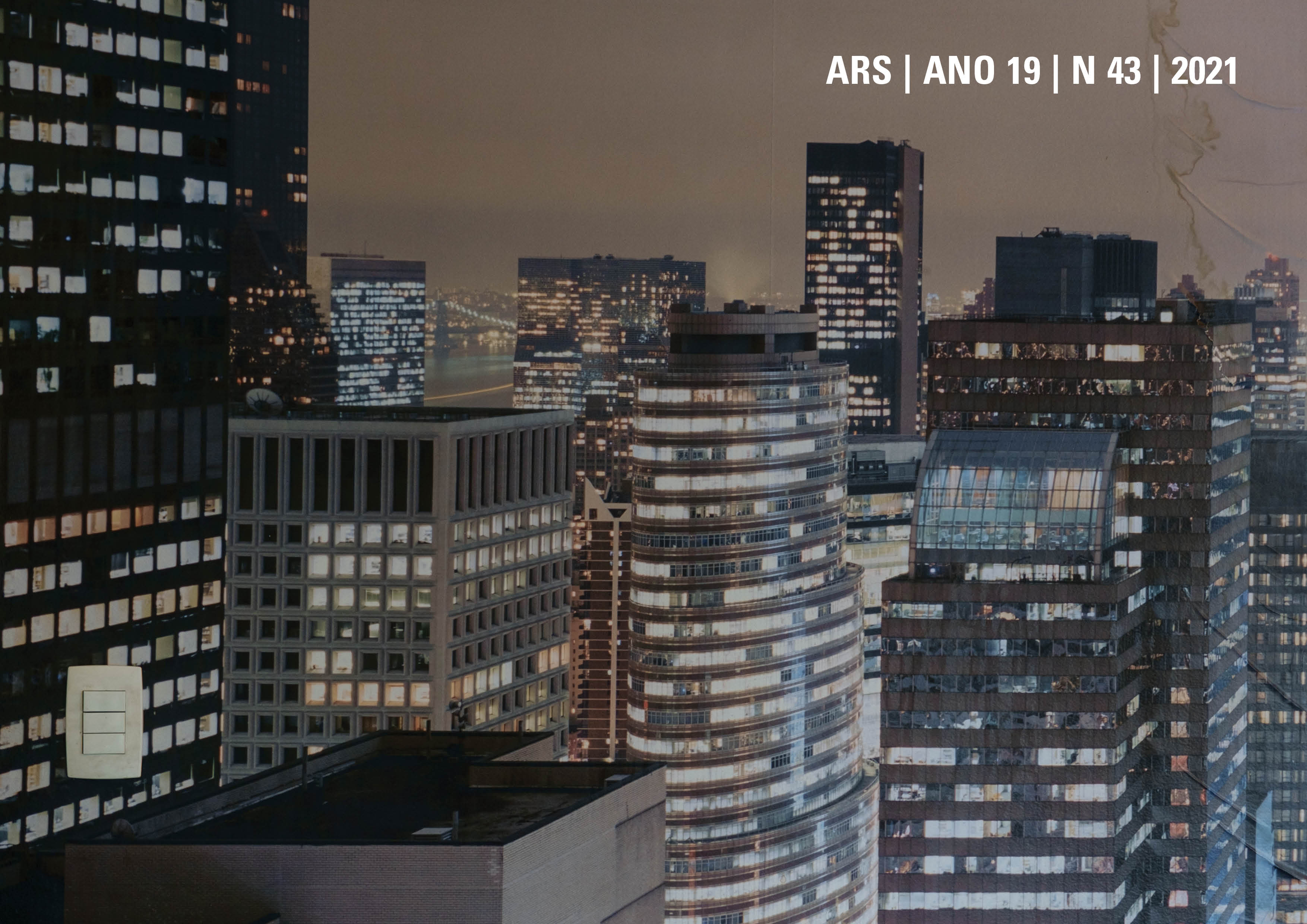Miniature Community: Art, Modernity, and Emptiness
DOI:
https://doi.org/10.11606/issn.2178-0447.ars.2021.182703Keywords:
Modernity, Community, Miniature, Oscar Masotta, León Ferrari, Albertina CarriAbstract
The expansion of modernity coincided with the miniaturization of the world, a condition highlighted, on many occasions, by Walter Benjamin, who ultimately turned it into a kind of method. Following this proposal, this text focuses on critical and artistic productions that use the forms of miniaturization. Oscar Masotta, León Ferrari, Albertina Carri and artists connected to conceptualism are protagonists in this improper community, which finds in the game with the miniatures a form of relationship with the emptiness.
Downloads
References
ALLOWAY, Lawrence. El desarrollo del pop-art británico. In LIPPARD, Lucy (ed.). El Pop Art. Barcelona: Destino; Thames and Hudson, 1993.
BENJAMIN, Walter. Rua de mão única. Obras escolhidas vol. II / trad. Rubens Rodrigues Torres Filho e José Carlos Martins Barbosa. São Paulo: Brasiliense, 1987.
BENJAMIN, Walter. Brinquedos e jogos: observações marginais sobre uma obra monumental [1928]. In BENJAMIN, Walter. Reflexões sobre a criança, o brinquedo e a educação / trad. Marcus Vinicius Mazzari. São Paulo: Duas cidades; Ed. 34, 2002, pp. 95-102.
COELHO, Teixeira. Revelações despudoradas de León Ferrari. In FERRARI, León. Imagens [1979-1984]. São Paulo: Edições Exu, 1989.
DUCHAMP, Marcel. The Essential Writings of Marcel Duchamp / ed. Michel Sanouillet e Elmer Peterson. Londres: Thames and Hudson, 1975.
FERRARI, León. Carta a Julio Cortázar, São Paulo, 26 nov. 1981. Fundación Augusto y León Ferrari – Arte y Acervo.
FERRARI, León. Homens. São Paulo: Edições Licopódio, 1984.
FERRARI, León. Imagens [1979-1984]. São Paulo: Edições Exu, 1989.
FERRARI, León. Planos y Papeles. Buenos Aires: Ediciones Licopodio, 2004.
FERREIRA, Glória. Arte como questão: anos 70. São Paulo: Instituto Tomie Ohtake, 2009.
GONZALEZ, Horacio. Karl Marx: o apanhador de sinais. São Paulo: Brasiliense, 1984.
GROYS, Boris. El arte conceptual del comunismo. In GROYS, Boris; DEL JUNCO, Manuel Fontán; HOLLEIN, Max. La ilustración total: arte conceptual de Moscú 1960-1990. Madrid: Fundación Juan March, 2008, pp. 18-27.
JACOBY, Roberto. Las herejías de León Ferrari. Crisis, Buenos Aires, n. 50, pp. 71-73, jan. 1987.
KABAKOV, Ilya. Sobre el vacío. In GROYS, Boris; DEL JUNCO, Manuel Fontán; HOLLEIN, Max. La ilustración total: arte conceptual de Moscú 1960-1990. Madrid: Fundación Juan March, 2008, pp. 358-368.
LEMA, Vicente Zito. León Ferrari y los secretos del hombre y la sociedad [Entrevista]. La voz, Buenos Aires, jul. 1984, p. 22.
MALVINO, Adriana. León Ferrari inaugura hoy su exposición: ningún artista ha logrado reflejar, fuera de Argentina, la violencia de la represión. Unomásuno, Cidade do México, 7 abr. 1982, p. 50.
MASOTTA, Oscar. Introducción a la lectura de Jacques Lacan [1970]. 4 ed. Buenos Aires: Corregidor, 1988.
MASOTTA, Oscar. El “esquematismo” contemporáneo y la historieta. In MASOTTA, Oscar [ANO?]. Conciencia y estructura. Buenos Aires: Eterna Cadencia, 2010, pp. 263-272.
MASOTTA, Oscar. Sur o el antiperonismo colonialista [1956]. In MASOTTA, Oscar. Conciencia y estructura. Buenos Aires: Eterna Cadencia, 2010.
MASOTTA, Oscar. Reflexiones presemiológicas sobre la historieta: el “esquematismo” [1967]. In MASOTTA, Oscar. Conciencia y estructura. Buenos Aires: Eterna Cadencia, 2010.
MONASTYRSKI, Andrei. Prologo al primer tomo de Viajes a las afueras de la ciudad [1980]. In GROYS, Boris; DEL JUNCO, Manuel Fontán; HOLLEIN, Max. La ilustración total: arte conceptual de Moscú 1960-1990. Madrid: Fundación Juan March, 2008, pp. 323-330.
NOVAES, Adriana Carvalho. O canto de Perséfone: o Grupo Sur e a cultura de massa argentina (1956-1961). São Paulo: Annablume, 2006.
RED Conceptualismos del Sur. Perder la forma humana: una imagen sísmica de los años ochenta en América Latina. Madrid: Museo Nacional Centro de Arte Reina Sofía, 2012.
SARLO, Beatriz. Tiempo pasado: cultura de la memoria y giro subjetivo. Buenos Aires: Siglo XXI, 2005.
VICTORIA, Marcos. El cine y la cultura ‘Kitsch’. Sur, Buenos Aires, n. 248, pp. 78-86, set.-out. 1957.
VILA-MATAS, Henrique. História abreviada da literatura portátil / trad. Júlio Pimentel Pinto. São Paulo: Cosac Naify, 2011.
Filmes
Los rubios (2003). Albertina Carri, Argentina, 83 min.
Bibliografia Complementar
DERRIDA, Jacques. Mal de arquivo: uma impressão freudiana / trad. Claudia de Moraes Rego. Rio de Janeiro: Relume Dumará, 2001.
DIDI-HUBERMAN, Georges. Atlas ¿Cómo llevar el mundo a cuestas? Madrid: Museo Nacional Centro de Arte Reina Sofía, 2011.
DOANE, Mary Ann. The Emergence of Cinematic Time: Modernity, Contingency, the Archive. Cambridge: Harvard University Press, 2002.
GROYS, Boris. A arte na era da biopolítica: da obra de arte à documentação de arte. In GROYS, Boris. Arte, Poder / trad. Virgínia Starling. Belo Horizonte: Editora UFMG, 2015, pp. 73-82.
SARLO, Beatriz. Escenas de la vida posmoderna: intelectuales, arte y videocultura en la Argentina. 2 ed. Buenos Aires: Ariel, 1994.
VENTURI, Robert; SCOTT BROWN, Denise; IZENOUR, Steven. Aprendendo com Las Vegas. O simbolismo (esquecido) da forma arquitetônica / trad. Pedro Maia Soares. São Paulo: Cosac & Naify, 2003.
Downloads
Published
Issue
Section
License
Copyright (c) 2021 Artur de Vargas Giorgi

This work is licensed under a Creative Commons Attribution-NonCommercial 4.0 International License.
The responsibility for obtaining written permission to use in the articles materials protected by copyright law lies entirely with the author(s). Ars is not responsible for copyright breaches made by its collaborators.
The authors have the copyrights and grant the journal the right of the first publication, with the article licensed under the Creative Commons BY-CC License.
Licensees have the right to copy, distribute, display, and carry out the work and make derivative works from it, including with commercial purposes, granted that they give the due credit to the author or licensor, as specified by them.
Licensees compromise to inform the appropriate credit, provide a link to the license, and indicate if changes were made.
Respected the terms of the license, the licensors/authors are not allowed to revoke the conditions above mentioned.
After the publication of the articles, the authors keep the copyrights and the rights to republish the text exclusively in unpublished books and collections.



